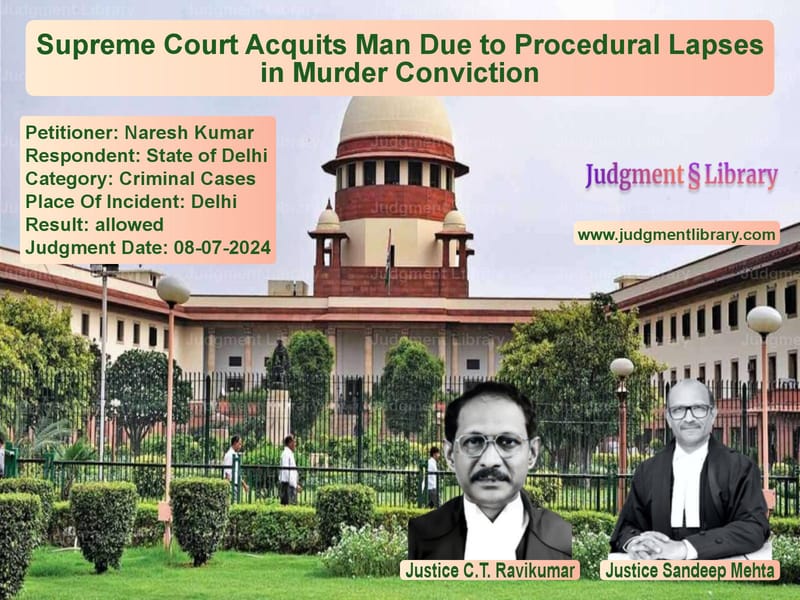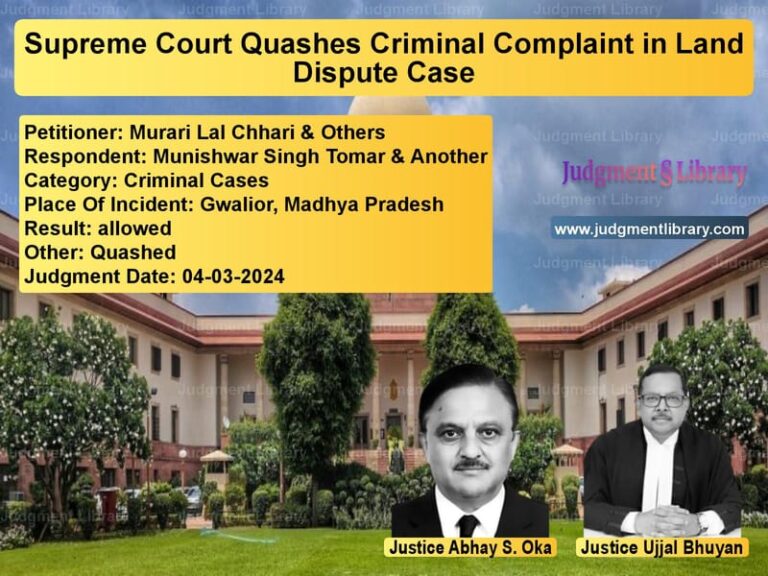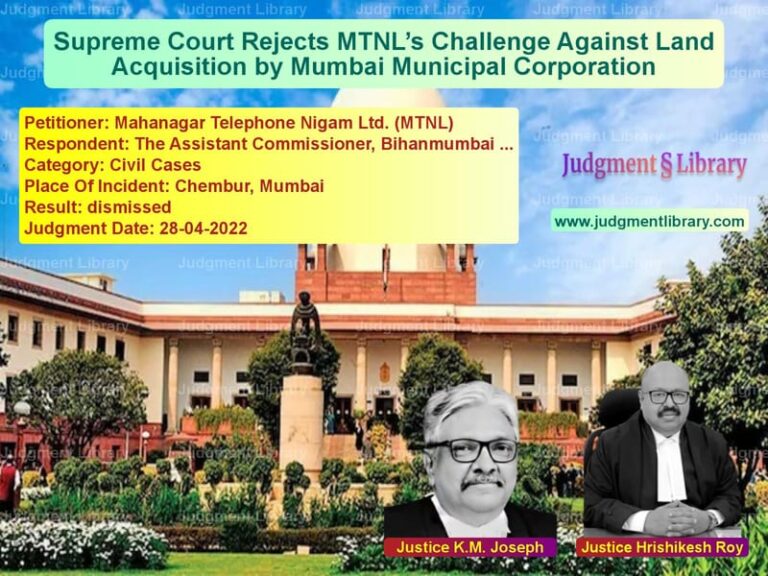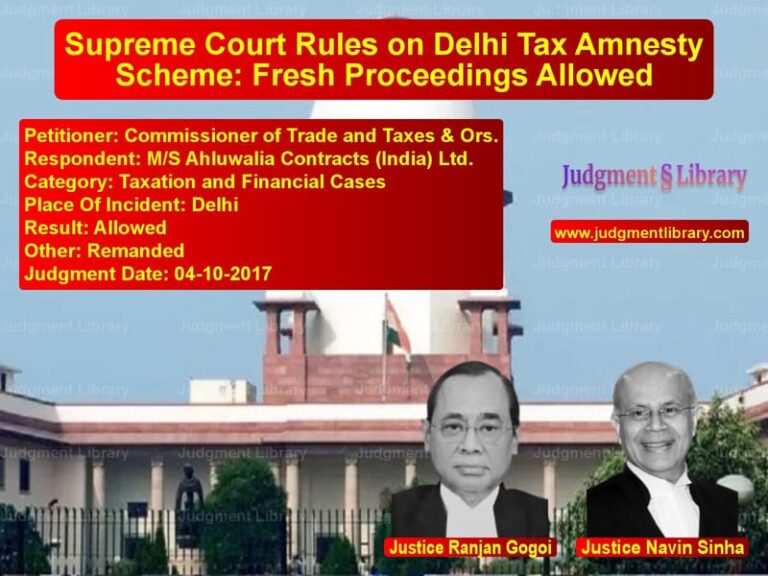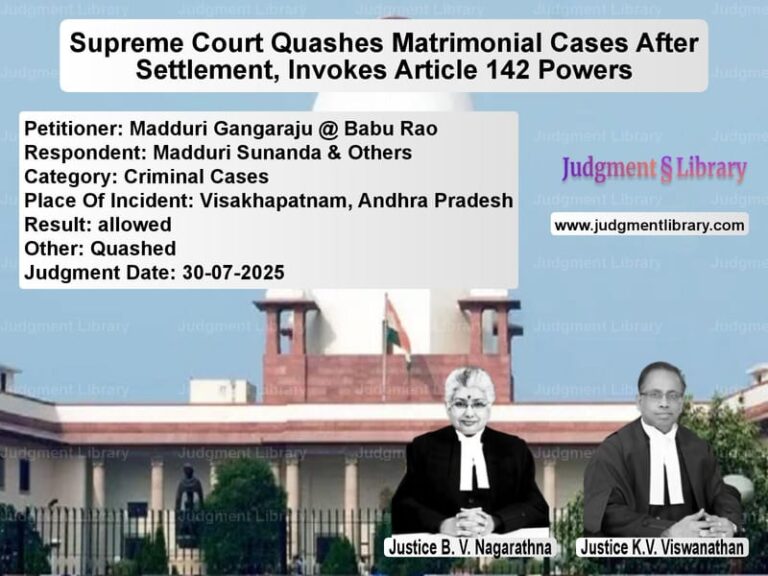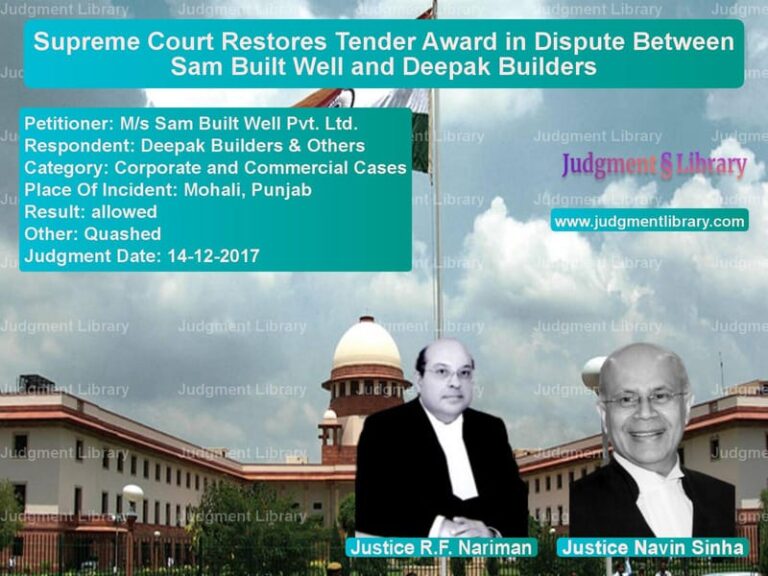Supreme Court Acquits Man Due to Procedural Lapses in Murder Conviction
The case of Naresh Kumar vs. State of Delhi is a significant ruling concerning procedural lapses in criminal trials, particularly in compliance with Section 313 of the Code of Criminal Procedure (CrPC). The Supreme Court overturned the conviction of the appellant, who was sentenced to life imprisonment under Section 302 IPC with the aid of Section 34 IPC. The judgment reinforces the importance of fair trial principles and the necessity of providing the accused an opportunity to explain incriminating evidence against him.
Background of the Case
The case pertains to the murder of Arun Kumar on June 14, 1995, in Delhi. The dispute arose over an argument between the deceased’s sister, Laxmi, and the wife of the appellant regarding water spilling over their house. The prosecution alleged that the argument escalated into a fatal altercation, where the appellant’s brother, Mahinder Kumar, stabbed Arun Kumar to death while the appellant held the victim to facilitate the attack.
The trial court convicted the appellant under Section 302 IPC with the aid of Section 34 IPC and sentenced him to life imprisonment. The conviction was upheld by the Delhi High Court. The appellant then approached the Supreme Court, arguing that his examination under Section 313 CrPC was inadequate and prejudicial.
Petitioner’s Arguments
The appellant’s counsel presented the following key arguments:
- The appellant was not properly questioned under Section 313 CrPC regarding two key incriminating circumstances—his alleged exhortation to kill the deceased and his act of holding the victim to facilitate the stabbing.
- The absence of these questions denied him a fair opportunity to explain his version, violating his right to a fair trial.
- The prosecution’s case relied heavily on eyewitness testimonies, which were not corroborated by any independent forensic or material evidence.
- The incident occurred over 29 years ago, and the appellant had already served more than 12 years in custody.
Respondent’s Arguments
The prosecution defended the conviction with the following arguments:
- The appellant was present at the crime scene and actively facilitated the attack.
- Eyewitness testimonies clearly implicated him in the crime.
- The procedural lapse in his Section 313 CrPC examination was not fatal to the conviction, as there was sufficient evidence against him.
- The appellant had not raised this issue before the High Court and was now using it as a last resort to evade punishment.
Supreme Court’s Observations
The Supreme Court scrutinized the procedural lapses in the trial and emphasized the importance of Section 313 CrPC in ensuring a fair trial. The Court noted:
“The examination of an accused under Section 313 CrPC is not a mere formality; it is a fundamental right ensuring that the accused is given an opportunity to explain the circumstances appearing against him.”
Regarding the prosecution’s failure to question the appellant on two key incriminating factors, the Court stated:
“The failure to put these material circumstances to the accused has resulted in material prejudice, as it directly affects the basis of his conviction under Section 34 IPC.”
The Court also examined precedents, including Raj Kumar vs. State (NCT of Delhi), which emphasized that non-compliance with Section 313 CrPC can vitiate a trial if it results in prejudice to the accused.
Final Verdict
The Supreme Court allowed the appeal and acquitted the appellant, ruling:
“The failure to question the appellant on crucial incriminating circumstances has vitiated the trial. The conviction is set aside, and the appellant is acquitted of all charges.”
The Court ordered the immediate release of the appellant unless required in any other case.
Implications of the Judgment
This ruling underscores the necessity of fair trial safeguards and procedural compliance in criminal cases. Key takeaways include:
- Importance of Section 313 CrPC: Accused persons must be given an opportunity to explain all material evidence against them.
- Procedural Lapses Can Lead to Acquittal: Failure to follow due process can render a conviction invalid.
- Delay in Raising Procedural Issues Does Not Bar Relief: Even if an issue was not raised in earlier appeals, the Supreme Court can still consider it if it affects the fairness of the trial.
Conclusion
The Supreme Court’s ruling in this case reinforces the principle that procedural fairness is paramount in criminal trials. By setting aside the conviction due to inadequate examination under Section 313 CrPC, the judgment highlights the judiciary’s commitment to upholding the fundamental rights of accused persons.
Petitioner Name: Naresh Kumar.Respondent Name: State of Delhi.Judgment By: Justice C.T. Ravikumar, Justice Sandeep Mehta.Place Of Incident: Delhi.Judgment Date: 08-07-2024.
Don’t miss out on the full details! Download the complete judgment in PDF format below and gain valuable insights instantly!
Download Judgment: naresh-kumar-vs-state-of-delhi-supreme-court-of-india-judgment-dated-08-07-2024.pdf
Directly Download Judgment: Directly download this Judgment
See all petitions in Murder Cases
See all petitions in Bail and Anticipatory Bail
See all petitions in Juvenile Justice
See all petitions in Custodial Deaths and Police Misconduct
See all petitions in Attempt to Murder Cases
See all petitions in Judgment by C.T. Ravikumar
See all petitions in Judgment by Sandeep Mehta
See all petitions in allowed
See all petitions in supreme court of India judgments July 2024
See all petitions in 2024 judgments
See all posts in Criminal Cases Category
See all allowed petitions in Criminal Cases Category
See all Dismissed petitions in Criminal Cases Category
See all partially allowed petitions in Criminal Cases Category

